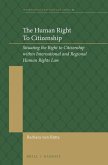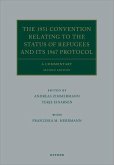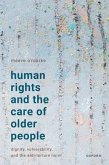Cesare P R Romano, Andrea Boggio
The Human Right to Science
History, Development, and Normative Content
Cesare P R Romano, Andrea Boggio
The Human Right to Science
History, Development, and Normative Content
- Gebundenes Buch
- Merkliste
- Auf die Merkliste
- Bewerten Bewerten
- Teilen
- Produkt teilen
- Produkterinnerung
- Produkterinnerung
The Human Right to Science offers a thorough and systematic analysis of the right to science in all of its critical aspects. Authored by experts in international law and science policy, the book meticulously explores the right's origins, development, and normative content. In doing so, it uncovers previously unarticulated entitlements and obligations, offering new insights on human rights interconnections.
Andere Kunden interessierten sich auch für
![The 3 Regional Human Rights Courts in Context The 3 Regional Human Rights Courts in Context]() Laurence Burgorgue-LarsenThe 3 Regional Human Rights Courts in Context207,99 €
Laurence Burgorgue-LarsenThe 3 Regional Human Rights Courts in Context207,99 €![Documents on the Law of Un Peace Operations Documents on the Law of Un Peace Operations]() Bruce OswaldDocuments on the Law of Un Peace Operations177,99 €
Bruce OswaldDocuments on the Law of Un Peace Operations177,99 €![Taking a Case to the European Court of Human Rights Taking a Case to the European Court of Human Rights]() Philip LeachTaking a Case to the European Court of Human Rights280,99 €
Philip LeachTaking a Case to the European Court of Human Rights280,99 €![The Human Right to Citizenship The Human Right to Citizenship]() Barbara von RütteThe Human Right to Citizenship232,99 €
Barbara von RütteThe Human Right to Citizenship232,99 €![The European Union and Human Rights The European Union and Human Rights]() Jan WoutersThe European Union and Human Rights236,99 €
Jan WoutersThe European Union and Human Rights236,99 €![The 1951 Convention Relating to the Status of Refugees and Its 1967 Protocol The 1951 Convention Relating to the Status of Refugees and Its 1967 Protocol]() Andreas ZimmermannThe 1951 Convention Relating to the Status of Refugees and Its 1967 Protocol672,99 €
Andreas ZimmermannThe 1951 Convention Relating to the Status of Refugees and Its 1967 Protocol672,99 €![Human Rights and the Care of Older People Human Rights and the Care of Older People]() Maeve O'RourkeHuman Rights and the Care of Older People133,99 €
Maeve O'RourkeHuman Rights and the Care of Older People133,99 €-
-
-
The Human Right to Science offers a thorough and systematic analysis of the right to science in all of its critical aspects. Authored by experts in international law and science policy, the book meticulously explores the right's origins, development, and normative content. In doing so, it uncovers previously unarticulated entitlements and obligations, offering new insights on human rights interconnections.
Hinweis: Dieser Artikel kann nur an eine deutsche Lieferadresse ausgeliefert werden.
Hinweis: Dieser Artikel kann nur an eine deutsche Lieferadresse ausgeliefert werden.
Produktdetails
- Produktdetails
- Verlag: Oxford University Press
- Seitenzahl: 904
- Erscheinungstermin: 15. Oktober 2024
- Englisch
- Abmessung: 231mm x 157mm x 64mm
- Gewicht: 1361g
- ISBN-13: 9780197768990
- ISBN-10: 0197768997
- Artikelnr.: 70983483
- Herstellerkennzeichnung
- Libri GmbH
- Europaallee 1
- 36244 Bad Hersfeld
- gpsr@libri.de
- Verlag: Oxford University Press
- Seitenzahl: 904
- Erscheinungstermin: 15. Oktober 2024
- Englisch
- Abmessung: 231mm x 157mm x 64mm
- Gewicht: 1361g
- ISBN-13: 9780197768990
- ISBN-10: 0197768997
- Artikelnr.: 70983483
- Herstellerkennzeichnung
- Libri GmbH
- Europaallee 1
- 36244 Bad Hersfeld
- gpsr@libri.de
Cesare Romanois a Professor of Law at Loyola Law School, Los Angeles (Loyola Marymount University) and a W. Joseph Ford fellow. Between 1996 and 2006 he created, developed, and managed the Project on International Courts and Tribunals, a joint undertaking of the Center on International Cooperation, New York University, and the Centre for International Courts and Tribunals, University College London, becoming a world-renowned authority in the field of international adjudication. In 2011, he put his knowledge of the law and procedure of international adjudicative bodies to the service of victims of human rights violations. He founded the International Human Rights Center at Loyola Law School, Los Angeles, and, since then, has litigated dozens of cases before variousinternational human rights bodies, including the first case to claim violation of the Right to Science (CESCR, S.C. and G.P. v Italy, 22/2017). In 2018, Professor Romano co-established Science for Democracy, a Brussels-based NGO whose goal is to promote the human right to science and the rights of science, and he has been the organization's Secretary General since 2023. Andrea Boggio is a Professor of Legal Studies in the Department of Politics, Law, and Society and a Fellow of the Center for Health and Behavioral Sciences at Bryant University. Professor Boggio has practiced law full-time both in Italy and the United States, working on litigation involving complex scientific evidence. He joined Bryant University after completing a post-doc in bioethics at the University ofGeneva and teaching applied ethics at Keele University in the United Kingdom. His expertise in the governance of scientific progress and emerging technologies has led to numerous consultancies for international bodies (i.e. UNESCO, WHO, CESCR, and OECD), human rights experts (i.e. the Special Rapporteur on Cultural Rights, the Special Rapporteur on the Right to Education, the Special Rapporteur on Toxics and Human Rights, and the Special Rapporteur on the Freedom of Opinion and Expression), and governments (i.e. Canada and Italy).
* Part I: Aims, Methodology and Definitions
* Chapter 1: Methodology and Definitions
* Part II: The History of the Right to Science
* Chapter 2: From the American Declaration to the Universal Declaration
of Human Rights
* Chapter 3: From the Universal Declaration to the Covenant on
Economic, Social, and Cultural Rights
* Part III: Mapping the Right to Science in Law
* Chapter 4: The UN and the Right to Science
* Chapter 5: UNESCO and the Right to Science
* Chapter 6: Regional Human Rights Regimes and the Right to Science
* Chapter 7: The Right to Science in National Constitutions
* Part IV: The Normative Content of the Right to Science
* Chapter 8: Finding the Normative Content of the Right to Science: An
Introduction
* Chapter 9: The Right to Scientific Progress and to Scientific Freedom
* Chapter 10: The Right to Responsible Scientific Progress (Scientific
Responsibility)
* Chapter 11: The Right to Participate in Scientific Progress
* Chapter 12: The Right to Benefit from Scientific Progress
* Part V: Conclusions
* Chapter 13: The Future of the Right to Science
* Chapter 1: Methodology and Definitions
* Part II: The History of the Right to Science
* Chapter 2: From the American Declaration to the Universal Declaration
of Human Rights
* Chapter 3: From the Universal Declaration to the Covenant on
Economic, Social, and Cultural Rights
* Part III: Mapping the Right to Science in Law
* Chapter 4: The UN and the Right to Science
* Chapter 5: UNESCO and the Right to Science
* Chapter 6: Regional Human Rights Regimes and the Right to Science
* Chapter 7: The Right to Science in National Constitutions
* Part IV: The Normative Content of the Right to Science
* Chapter 8: Finding the Normative Content of the Right to Science: An
Introduction
* Chapter 9: The Right to Scientific Progress and to Scientific Freedom
* Chapter 10: The Right to Responsible Scientific Progress (Scientific
Responsibility)
* Chapter 11: The Right to Participate in Scientific Progress
* Chapter 12: The Right to Benefit from Scientific Progress
* Part V: Conclusions
* Chapter 13: The Future of the Right to Science
* Part I: Aims, Methodology and Definitions
* Chapter 1: Methodology and Definitions
* Part II: The History of the Right to Science
* Chapter 2: From the American Declaration to the Universal Declaration
of Human Rights
* Chapter 3: From the Universal Declaration to the Covenant on
Economic, Social, and Cultural Rights
* Part III: Mapping the Right to Science in Law
* Chapter 4: The UN and the Right to Science
* Chapter 5: UNESCO and the Right to Science
* Chapter 6: Regional Human Rights Regimes and the Right to Science
* Chapter 7: The Right to Science in National Constitutions
* Part IV: The Normative Content of the Right to Science
* Chapter 8: Finding the Normative Content of the Right to Science: An
Introduction
* Chapter 9: The Right to Scientific Progress and to Scientific Freedom
* Chapter 10: The Right to Responsible Scientific Progress (Scientific
Responsibility)
* Chapter 11: The Right to Participate in Scientific Progress
* Chapter 12: The Right to Benefit from Scientific Progress
* Part V: Conclusions
* Chapter 13: The Future of the Right to Science
* Chapter 1: Methodology and Definitions
* Part II: The History of the Right to Science
* Chapter 2: From the American Declaration to the Universal Declaration
of Human Rights
* Chapter 3: From the Universal Declaration to the Covenant on
Economic, Social, and Cultural Rights
* Part III: Mapping the Right to Science in Law
* Chapter 4: The UN and the Right to Science
* Chapter 5: UNESCO and the Right to Science
* Chapter 6: Regional Human Rights Regimes and the Right to Science
* Chapter 7: The Right to Science in National Constitutions
* Part IV: The Normative Content of the Right to Science
* Chapter 8: Finding the Normative Content of the Right to Science: An
Introduction
* Chapter 9: The Right to Scientific Progress and to Scientific Freedom
* Chapter 10: The Right to Responsible Scientific Progress (Scientific
Responsibility)
* Chapter 11: The Right to Participate in Scientific Progress
* Chapter 12: The Right to Benefit from Scientific Progress
* Part V: Conclusions
* Chapter 13: The Future of the Right to Science








